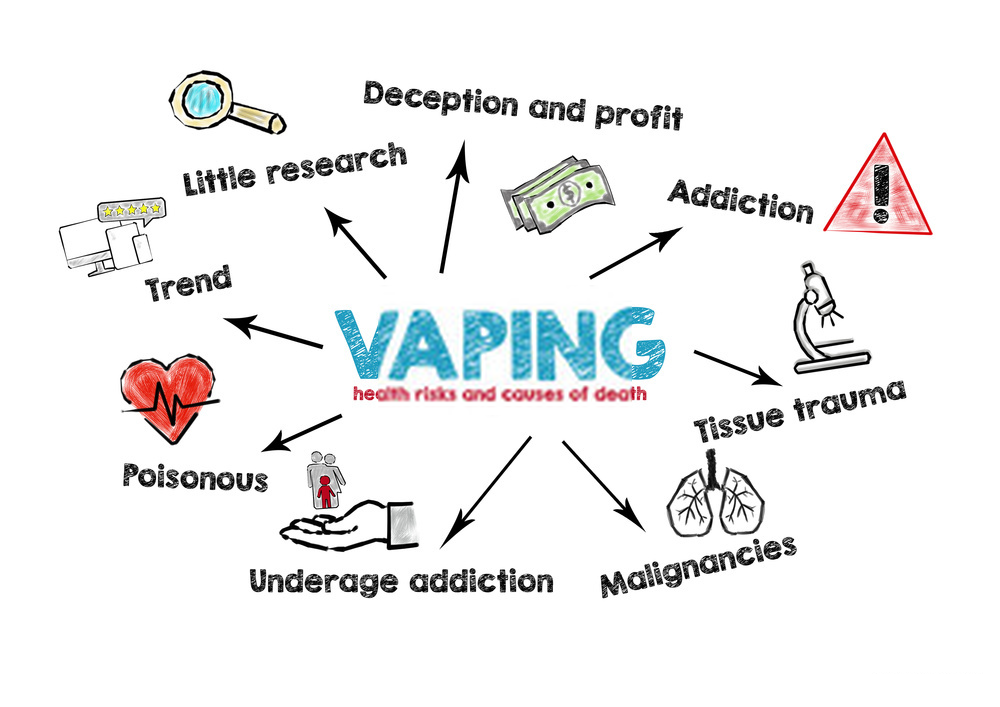20 Reasons Why Wellness Vapes Pose Serious Health Risks
In recent years, the popularity of wellness vapes has surged, with many individuals turning to these products in search of purported health benefits. Marketed as a safer alternative to traditional smoking and endorsed for their supposed wellness-enhancing properties, these vaping devices have garnered widespread attention. However, the U.S. Food and Drug Administration (FDA) has issued a stark warning, cautioning consumers about the potential dangers associated with wellness vapes. Despite their alluring promises, these products may pose significant risks to respiratory health and overall well-being. In this article, we’ll explore twenty compelling reasons why it is not safe to use wellness vapes and why putting anything unknown into our lungs should be approached with utmost caution.
- Lack of Regulation: Wellness vapes often operate in a regulatory gray area, leading to inconsistent quality control and oversight.
- Unknown Ingredients: Many wellness vape formulations contain undisclosed or unregulated ingredients, raising concerns about safety and potential health risks.
- Respiratory Irritation: Inhalation of vaporized substances can irritate the respiratory tract, leading to coughing, wheezing, and discomfort.
- Airway Constriction: Certain compounds found in wellness vape liquids may trigger airway constriction, making breathing difficult for individuals with asthma or other respiratory conditions.
- Lung Damage: Prolonged exposure to vaporized chemicals may contribute to lung damage and respiratory ailments, including inflammation and scarring.
- Chemical Exposure: Heating elements in vaping devices can produce harmful byproducts and toxic chemicals, which users may unknowingly inhale.
- Nicotine Addiction: Many wellness vapes contain nicotine, a highly addictive substance that can lead to dependence and adverse health effects.
- Gateway to Smoking: There is evidence to suggest that vaping among youth may serve as a gateway to conventional cigarette smoking, perpetuating nicotine addiction and associated health risks.
- Flavoring Agents: Flavoring additives used in wellness vapes may pose additional health hazards when heated and inhaled, including respiratory irritation and lung inflammation.
- Lack of Long-Term Studies: Limited research exists on the long-term health effects of vaping, particularly concerning the use of wellness vapes and their impact on respiratory function.
- Aerosol Exposure: Secondhand exposure to vapor aerosols emitted by wellness vapes may pose risks to bystanders, especially in enclosed or poorly ventilated spaces.
- Allergic Reactions: Some individuals may experience allergic reactions to ingredients found in wellness vape liquids, leading to symptoms such as skin rashes, itching, and respiratory distress.
- Contaminant Exposure: Poor manufacturing practices and inadequate quality control measures may result in contamination of wellness vape products with harmful substances, such as heavy metals or pesticides.
- Risk of Overdose: Inconsistent dosing and variability in product potency increase the risk of accidental overdose or adverse reactions among users.
- Impaired Lung Function: Chronic use of wellness vapes has been associated with impaired lung function and decreased respiratory capacity, particularly among frequent users.
- Cardiovascular Risks: Nicotine-containing wellness vapes may elevate heart rate and blood pressure, increasing the risk of cardiovascular events and complications.
- Regulatory Loopholes: The absence of stringent regulations governing wellness vape products leaves consumers vulnerable to deceptive marketing tactics and unsafe practices.
- Youth Appeal: Clever marketing strategies and enticing flavor options contribute to the appeal of wellness vapes among young people, potentially exposing them to lifelong health risks.
- Misleading Health Claims: Manufacturers often make unsubstantiated claims about the wellness benefits of vaping, obscuring the potential risks and dangers associated with these products.
- Ethical Considerations: Promoting the use of wellness vapes without adequate evidence of safety and efficacy raises ethical concerns and undermines public health efforts to combat tobacco-related harm.
In light of these reasons, it is evident that wellness vapes pose serious health risks and warrant careful scrutiny by consumers, healthcare professionals, and regulatory authorities alike. The pursuit of wellness should not come at the expense of respiratory health and overall well-being, underscoring the importance of informed decision-making and caution when it comes to vaping products.

